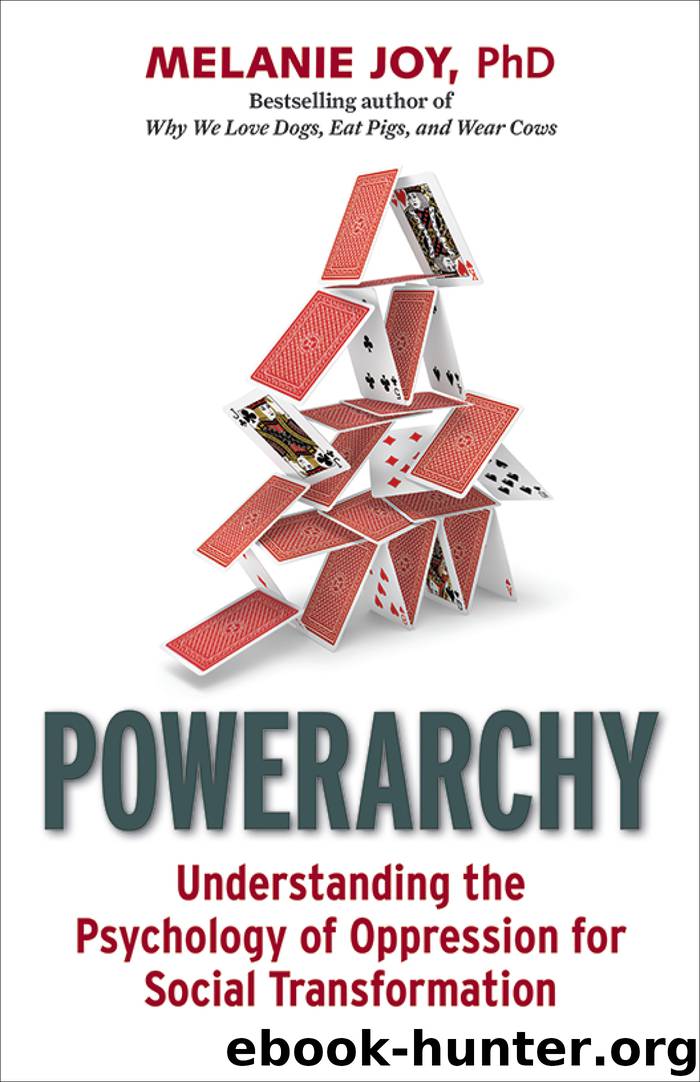Powerarchy by Melanie Joy

Author:Melanie Joy
Language: eng
Format: epub
Publisher: Berrett-Koehler Publishers
Published: 2019-09-08T16:00:00+00:00
THE MYTH OF MERITOCRACY
The assumption that the privileges granted to powerholders are due to merit rather than to luck—that they are earned rather than inherited from an unjust system—is central to keeping social powerarchies intact. This myth of meritocracy—the belief that ability and hard work are always fairly rewarded—causes members of dominant groups to feel deserving of their success and causes members of nondominant groups to feel that their lack of success is their own fault, and it keeps everyone from seeing that the system is set up to maintain privileges and power imbalances that benefit some at the expense of others. Consider, for example, how members of disadvantaged socioeconomic groups who struggle to feed their families tend to believe that their own shortcomings are the reason for their hardship14 (when they haven’t been encouraged to blame a convenient scapegoat, such as immigrants). If they were to recognize the real reason—the fact that they are on the losing end of a system that’s unfairly rigged—they would probably feel angry at the injustice of their circumstances rather than blame themselves and feel ashamed.
The myth of meritocracy is also the foundation on which neoliberal ideologies and policies—those that favor free-market capitalism—stand, and when this myth is exposed and recognized, it becomes clear that neoliberalism is unlikely to lead to a more just and equitable social order. Indeed, while the main objective of progressive social policies is to help offset the inherent power imbalance in social powerarchies—to offer subsidies and supports that help lessen the gap between members of privileged and disadvantaged social groups—neoliberal policies typically seek to remove such provisions.
A fundamental difference between left- and right-wing thought is that the left tends to recognize the role of systems in general, and of powerarchies in particular, in shaping social dynamics. Naturally, those with such awareness are more likely to support a political orientation that reflects this understanding.
Often, however, critics on the right reverse such cause and effect. For example, it is not uncommon for them to argue that social science departments—a source of legitimation for progressive policies—are influenced by a left-wing bias. This argument is based on the facts that most faculty in the social sciences identify as left-leaning,15 and most social scientists accept powerarchies as legitimate social phenomena. The argument reflects the assumption that social scientists’ progressive orientation causes them to believe in the existence of institutionalized power imbalances that unjustly privilege some at the expense of others—that the reason social scientists accept systems of oppression as valid is because they are left-leaning in the first place. However, it is far more likely that the opposite is true: social scientists’ understanding of systems of oppression is what leads them to support progressive politics. Consider, for example, how Galileo, who, following in the footsteps of his predecessor Copernicus, argued against geocentricism (the belief that the other planets and sun revolve around the earth) and for the progressive theory of heliocentrism (the belief that the earth and other planets revolve around the sun). It
Download
This site does not store any files on its server. We only index and link to content provided by other sites. Please contact the content providers to delete copyright contents if any and email us, we'll remove relevant links or contents immediately.
Rewire Your Anxious Brain by Catherine M. Pittman(18654)
Talking to Strangers by Malcolm Gladwell(13370)
The Art of Thinking Clearly by Rolf Dobelli(10487)
Mindhunter: Inside the FBI's Elite Serial Crime Unit by John E. Douglas & Mark Olshaker(9339)
Becoming Supernatural by Dr. Joe Dispenza(8214)
Change Your Questions, Change Your Life by Marilee Adams(7780)
Nudge - Improving Decisions about Health, Wealth, and Happiness by Thaler Sunstein(7706)
The Road Less Traveled by M. Scott Peck(7601)
The Lost Art of Listening by Michael P. Nichols(7506)
Mastermind: How to Think Like Sherlock Holmes by Maria Konnikova(7342)
Enlightenment Now: The Case for Reason, Science, Humanism, and Progress by Steven Pinker(7311)
Win Bigly by Scott Adams(7194)
The Way of Zen by Alan W. Watts(6614)
Daring Greatly by Brene Brown(6512)
Big Magic: Creative Living Beyond Fear by Elizabeth Gilbert(5771)
Grit by Angela Duckworth(5614)
Ego Is the Enemy by Ryan Holiday(5445)
Men In Love by Nancy Friday(5239)
The Laws of Human Nature by Robert Greene(5208)
